TerraNu® Trial Results: Demonstrating Root and Stalk Advantages in Southeastern Minnesota
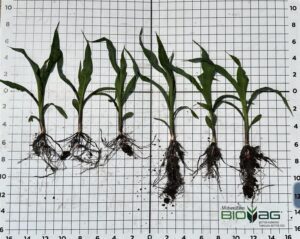
This image, take form a trial site in Southeastern Minnesota, highlights the visible difference between plants treated with TerraNu and an untreated control. While Midwestern BioAg typically recommends a lower potassium application rate for TerraNu, this particular trial explored the impact of applying TerraNu at a potassium-equivalent rate to conventional fertilizers.
The results are clear. The control plants (left) is noticeably shorter, with thinner stalks and a less developed root system. In contrast, the TerraNu treated plant (right) exhibits significantly more vigorous root growth, great root density, and enhanced root depth. The stalk is visibly thicker and nearly an inch taller – indicators of improved plant health and resilience.
Washed Root Comparison Highlight TerraNu’s Advantage
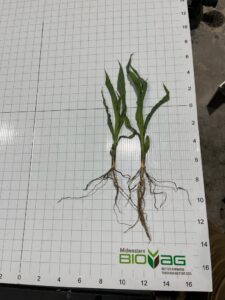
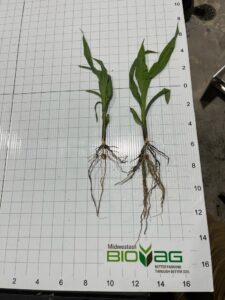
These three side-by-side images present a cleaned, detailed comparison of the six plants from our earlier evaluation. With the soil removed, the structural differences between the control group and the TerraNu treated plants become even more evident.
Across the board, the TerraNu – treated plants demonstrate superior growth. On average, treated plants are either equal to or approximately one inch taller than the control. Stalks show an average increase in thickness of 0.08 inches, indicating stronger structural integrity.
Root development is notably enhanced as well. TerraNu treated plants display fuller, deeper root systems. Our crown root measurement revealed over an inch of additional growth compared to untreated plants – a clear indicator of improved nutrient access and plant stability.
In-Field Visual Comparison: TerraNu vs. Control
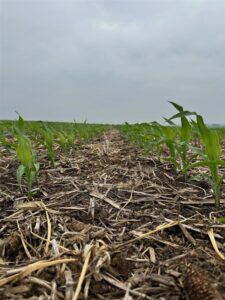
This image captures a clear visual contrast along the boundary between the untreated control (left) and the TerraNu treated crop (right). Even at a glance, the difference across the crop rows are evident.
Plants treated with TerraNu appear noticeably taller and more advanced in their development. They also exhibit thicker stems, fuller foliage, and a visibly healthier color – indicators of improved vigor and overall plant health.
Field Trial Spotlight: Bio-Cal® Performance in High-Salinity Conditions
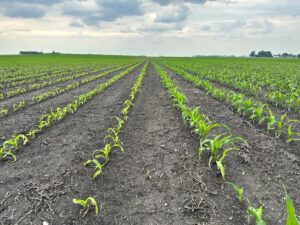
This image, taken from our Iowa trial site, shows a clear comparison between the untreated control (left) and the Bio-Cal treated (right), position along a dividing line in a field with elevated soil salinity due to pig manure application.
In this challenging environment, Bio-Cal proves to be the right solution. The treated plants display significantly more vigor growth, with noticeable advantages in height, canopy fullness, and overall plant color. These early-season performance gains point to Bio-Cal’s ability to support plant health in less-than ideal soil conditions.
This success is no accident…
These results show that strong yields begin with healthy soil. With TerraNu and Bio-Cal, you are not just feeding the crop, you are improving the soil that supports it. The treated plants stand out with better height, stronger stalks, fuller canopies, and deeper roots. These gains add up to healthier plants that perform more consistently, even in tough conditions. At Midwestern BioAg, we bring products and knowledge that work with your soil to build a strong foundation for better yields today and for years to come.
Better soils lead to better plants, stronger fields, and ultimately, higher yields.

